17 AI Courses for Quality Control Specialists that You Should Know About in 2025
Discover 17 essential AI courses designed to elevate quality control specialists by 2025. Enhance your skills and stay ahead in the industry with cutting-edge techniques and insights tailored for quality assurance excellence.
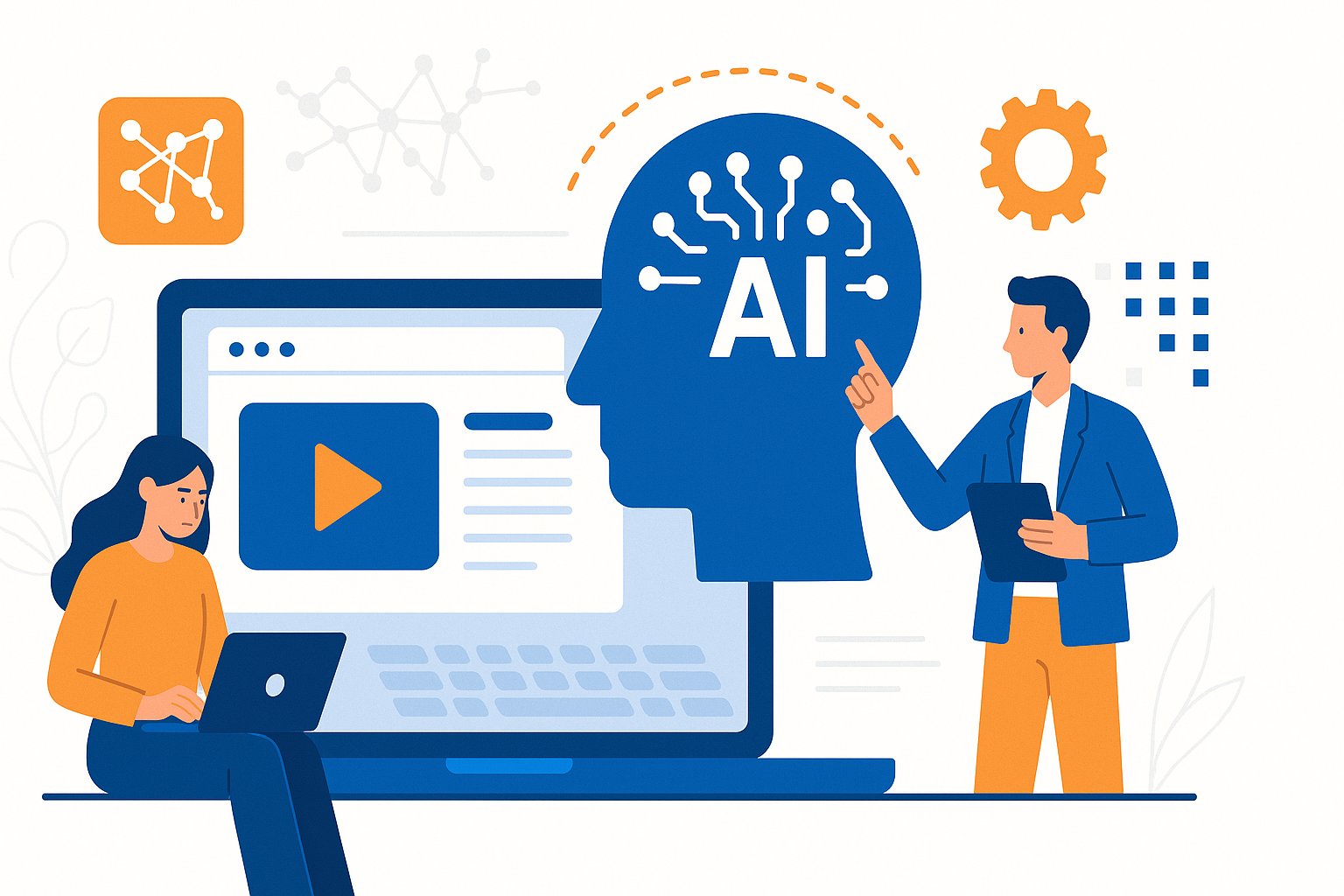
The integration of Artificial Intelligence (AI) into various industries is accelerating at an unprecedented pace, and the field of quality control is no exception. For Quality Control Specialists, the pressing need to stay updated with AI technologies is more critical than ever. As organizations strive for efficiency and precision, AI presents opportunities to transform traditional quality control processes, making it imperative for professionals in this field to upskill. The potential job impact is significant: those who fail to adapt may find themselves at a disadvantage, while those who embrace AI stand to enhance their careers substantially.
Why AI matters for Quality Control Specialists today
Artificial Intelligence is reshaping industries across the globe, and quality control is no different. According to recent statistics, 69% of businesses are actively incorporating AI into their operations to boost efficiency and reduce error margins. For Quality Control Specialists, understanding AI is not just an added skill—it is becoming a core requirement. This article aims to guide you through the process of selecting the best AI courses tailored for Quality Control Specialists to ensure you remain competitive in your profession.
The Growing Role of AI in Quality Control Specialists
AI applications are increasingly being integrated into the quality control sector, transforming the way tasks are performed. Automation is perhaps the most significant change, allowing for more consistent and faster inspection processes. AI algorithms enhance decision-making by providing data-driven insights, making it possible to predict defects and improve product quality. Additionally, AI enables personalization in quality control processes by adapting to specific product requirements and standards. These advancements are not merely optional; they are redefining how Quality Control Specialists approach their work, leading to more efficient workflows and improved accuracy.
Benefits of becoming an AI expert in Quality Control Specialists
For Quality Control Specialists, becoming proficient in AI offers a multitude of benefits. Mastery of AI tools and techniques can lead to improved job performance through enhanced process efficiency and reduced human error. It provides professionals with a competitive edge in the job market, as organizations increasingly seek individuals who can leverage AI to drive quality improvements. Additionally, understanding AI can open doors to new career opportunities, including leadership roles in quality management where AI strategies are crucial. By investing in AI education, Quality Control Specialists can ensure their skills remain relevant and valuable in a rapidly changing industry landscape.
This article will provide a detailed comparison of 17 AI courses specifically designed for Quality Control Specialists, including options like the CompleteAI Training. Each course offers unique insights and skills that cater to the diverse needs of professionals in this field, ensuring you can find the perfect fit for your career goals.

Comparison: All AI Courses for Quality Control Specialists (Updated Q2' 2025)
| Course Name | Provider | Price | Key Topics | Pros | Cons | Best For |
|---|---|---|---|---|---|---|
| AI for Quality Control Specialists (Video Courses + Certifications) | Complete AI Training | $29/month (monthly subscription), $8.25/month billed annually | Over 100 specialized video courses and certifications for Quality Control Specialists | Highest rating, extensive range of courses, daily updates, affordable pricing | Subscription based | Quality Control Specialists professionals |
| Certified AI Governance Professional (AIGP) | QA Limited | $2,180 USD (ex VAT) | AI governance, compliance, risk management | Responsible AI principles, governance focus | Higher cost, less technical | General learners |
| AI Quality Certification Program (AIQCP) | TÜV SÜD | Contact TÜV SÜD for pricing | AI quality management, safety, security, compliance | Comprehensive coverage, recognized certification | Pricing not publicly available | General learners |
| Certified AI Security Engineer | QA Limited | $3,800 USD (ex VAT) | AI security, threat management, infrastructure protection | Focus on AI security, practical exercises | High cost, technical background required | General learners |
| Generative AI Essentials | QA Limited | $1,880 USD (ex VAT) | Generative AI, ethical use, real-world applications | Basic generative AI concepts, practical strategies | Short duration, limited technical depth | General learners |
| Microsoft Azure AI Fundamentals (AI-900) | QA Limited | $1,290 USD (ex VAT) | AI workloads, Azure services, machine learning | Good for beginners, cloud-based AI tools | Azure-specific, basic level | General learners |
| BCS Essential Certificate in Artificial Intelligence (AI) | QA Limited | $1,120 USD (ex VAT) | AI terminology, principles, benefits, challenges | Strong foundation, covers risks and benefits | Limited technical depth | General learners |
| Developing Generative AI Applications on AWS | QA Limited | $2,750 USD (ex VAT) | Generative AI, AWS, LangChain | Practical application development, prompt engineering | Requires programming experience | General learners |
| Certified Ethical Emerging Technologist (CEET) | QA Limited | $4,520 USD (ex VAT) | AI ethics, safety, privacy, fairness | Comprehensive ethics coverage | High cost, less technical | General learners |
| BCS Foundation in Artificial Intelligence | QA Limited | $1,925 USD (ex VAT) | Intelligent agents, ethics, sustainability | Focus on ethics, sustainability | Limited technical content | General learners |
| AI Business Essentials for Leaders | QA Limited | $1,880 USD (ex VAT) | AI strategy, responsible deployment | Practical workshops, no technical prerequisites | Short duration | General learners |
| AI For Everyone | Deeplearning.ai via Coursera | $49.99/month (Coursera subscription) | AI overview, business integration | No prerequisites, AI literacy focus | Not technical, limited hands-on | General learners |
Understanding AI Training for Quality Control Specialists Professionals
The field of Quality Control is increasingly integrating artificial intelligence (AI) to enhance accuracy, efficiency, and innovation. As AI continues to influence various industries, Quality Control Specialists must stay informed and skilled in AI applications. This article presents a detailed comparison of AI courses designed for these professionals, evaluating each course's content, cost, and suitability.
Course 1: CompleteAI Training
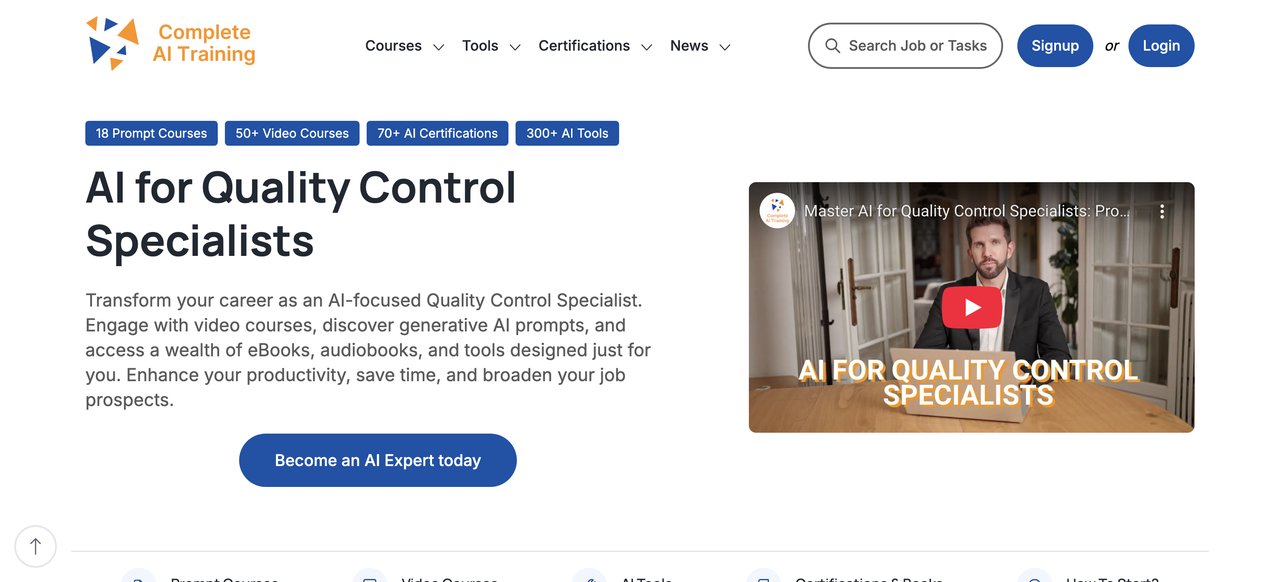
CompleteAI Training offers a comprehensive suite of over 100 video courses and certifications specifically designed for Quality Control Specialists. The platform provides ongoing updates on the latest AI tools and industry news, ensuring that subscribers remain at the forefront of AI advancements.
Key Topics Covered: Specialized AI techniques for quality control, industry-specific AI applications, AI tools and updates.
Target Audience and Skill Level: Quality Control Specialists seeking specialized AI knowledge. Suitable for all skill levels due to its extensive range of courses.
- Pros:
- Extensive course library tailored for Quality Control Specialists.
- Daily updates on AI tools and industry news.
- Affordable pricing, especially with an annual subscription.
- Cons:
- Requires an ongoing subscription for continuous learning.
Who Should Enroll: Professionals seeking comprehensive, up-to-date AI education specifically for quality control environments.
Course 2: Certified AI Governance Professional (AIGP) by QA Limited
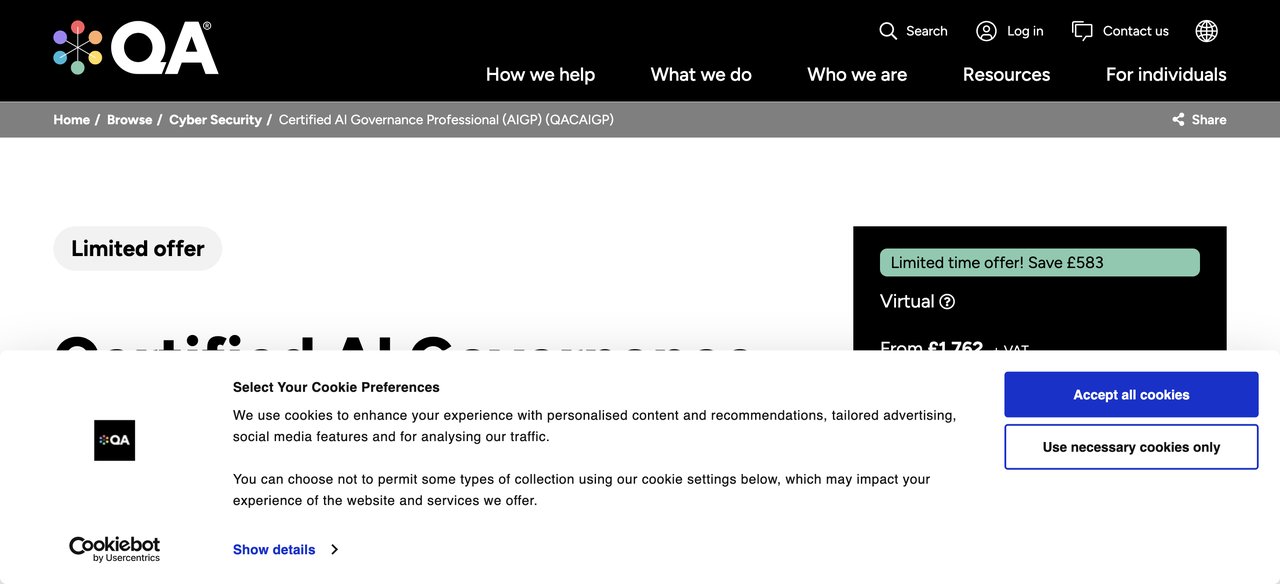
Certified AI Governance Professional by QA Limited focuses on integrating and deploying AI systems with a strong emphasis on governance, compliance, and ethical standards. This course is essential for professionals involved in evaluating and ensuring compliance with AI governance frameworks.
Key Topics Covered: Responsible AI principles, AI governance, compliance, and risk management.
Target Audience and Skill Level: Professionals in regulatory roles or those responsible for AI governance. Intermediate level, with a focus on policy and compliance.
- Pros:
- Covers comprehensive AI governance and compliance topics.
- Focuses on responsible AI deployment.
- Cons:
- Higher cost compared to other courses.
- Primarily governance-focused with less emphasis on technical implementation.
Who Should Enroll: Those responsible for AI policy-making, compliance, and governance within their organizations.
Course 3: AI Quality Certification Program (AIQCP) by TÜV SÜD
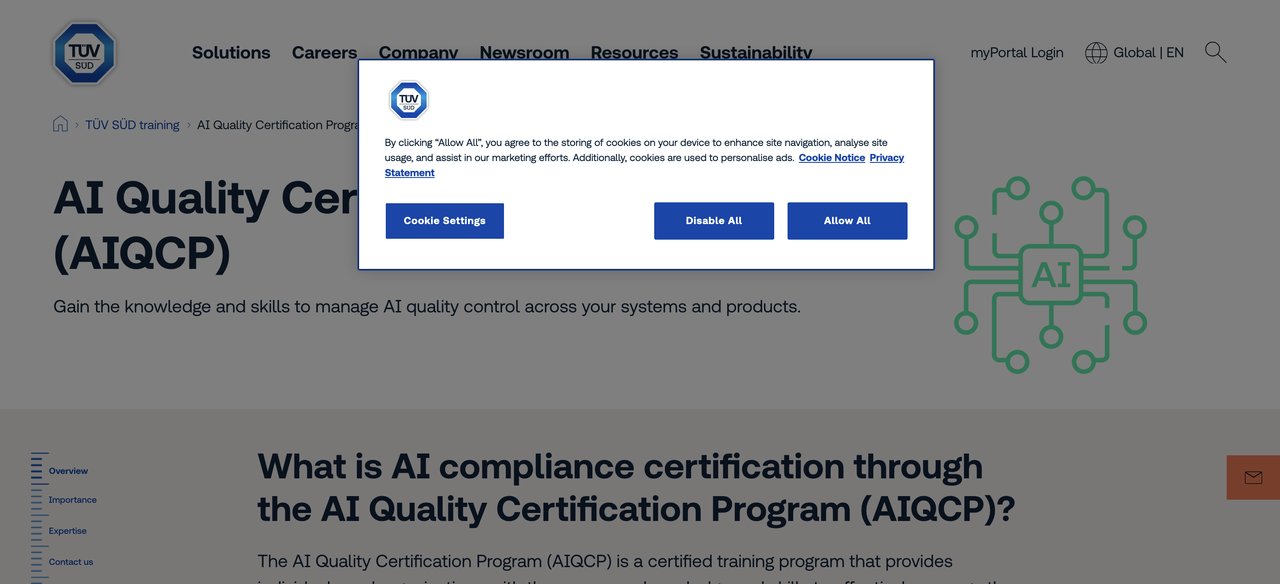
AI Quality Certification Program by TÜV SÜD offers a certified training program focusing on AI quality management across systems and products. The program addresses quality control, safety, and compliance, providing a comprehensive understanding of AI quality management.
Key Topics Covered: AI quality management, safety, security, legal compliance, and ethics.
Target Audience and Skill Level: Quality Control Specialists aiming to specialize in AI quality management. Foundation and Professional levels available.
- Pros:
- Comprehensive coverage of AI quality aspects.
- Recognized certification in AI and data quality management.
- Cons:
- Pricing not publicly available.
- Level 2 requires prior experience in AI quality management.
Who Should Enroll: Professionals seeking to enhance their expertise in AI quality management with recognized certification.
Course 4: Certified AI Security Engineer by QA Limited
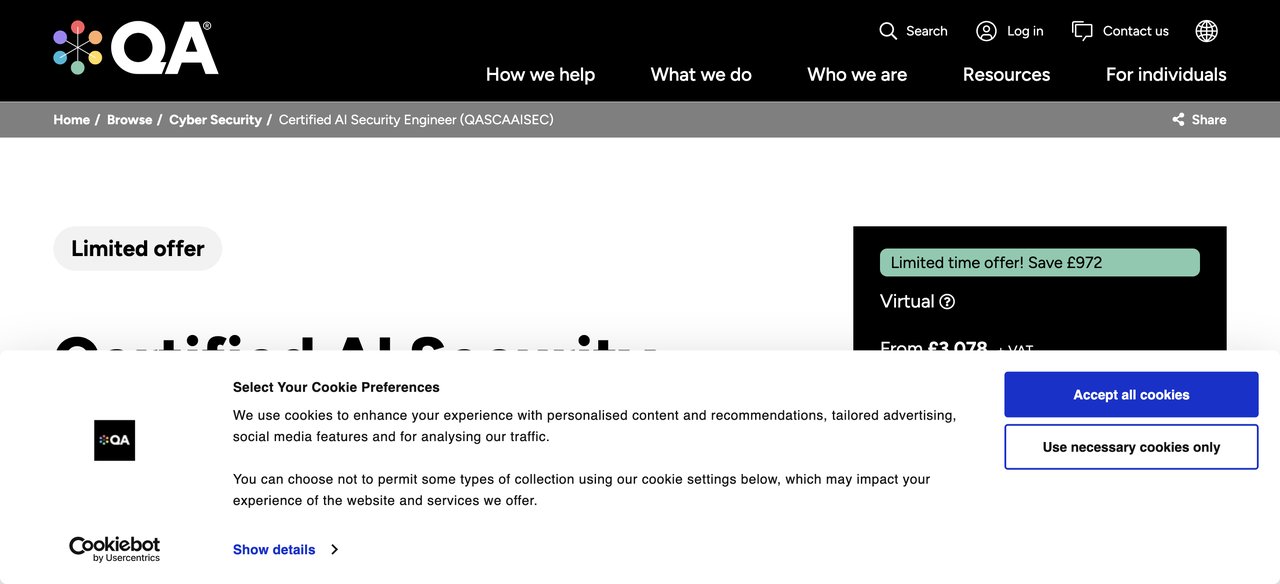
Certified AI Security Engineer by QA Limited is a hands-on course that focuses on securing AI systems, including large language models. It covers AI-specific threats and offers practical exercises on securing AI infrastructure.
Key Topics Covered: AI security landscape, AI-specific threats, secure integration, and infrastructure protection.
Target Audience and Skill Level: Security professionals and engineers with a technical background. Advanced level with hands-on exercises.
- Pros:
- Focus on AI security and vulnerabilities.
- Practical exercises for securing AI systems.
- Cons:
- High cost.
- Requires a technical background.
Who Should Enroll: Security professionals looking to specialize in AI system protection.
Course 5: Generative AI Essentials by QA Limited
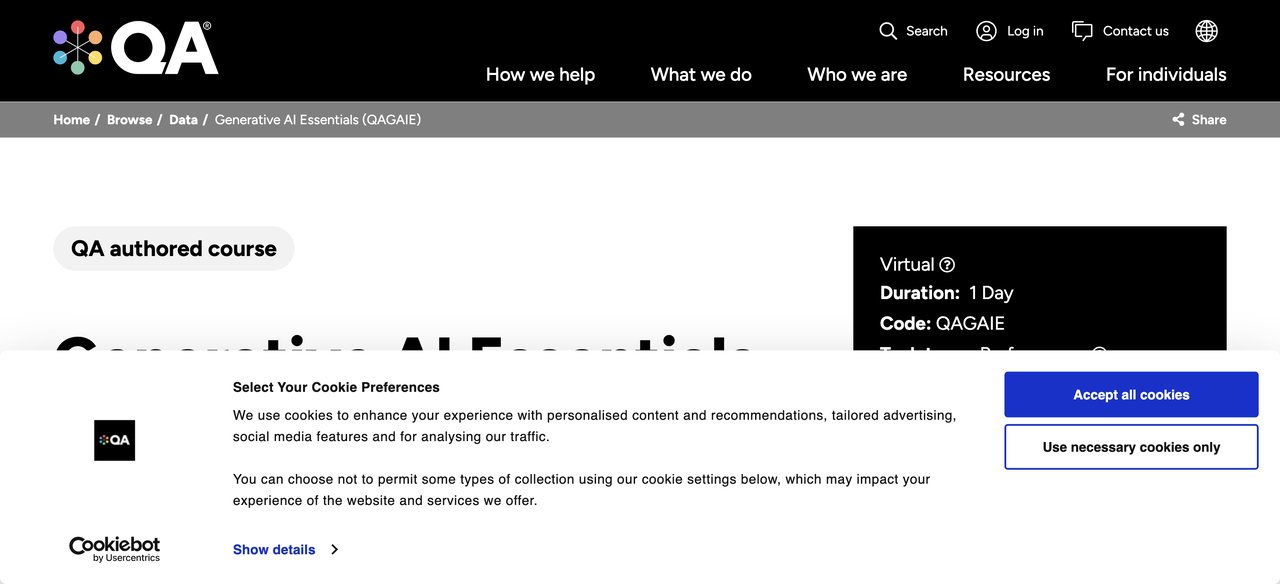
Generative AI Essentials by QA Limited is a one-day course designed for business professionals. It introduces the capabilities and ethical use of generative AI, providing practical implementation strategies.
Key Topics Covered: Basics of generative AI, ethical considerations, real-world applications.
Target Audience and Skill Level: Business professionals seeking a foundational understanding of generative AI. Suitable for non-technical participants.
- Pros:
- Covers the basics of generative AI and ethical use.
- Practical implementation strategies.
- Cons:
- Short duration.
- Limited technical depth.
Who Should Enroll: Business professionals exploring the potential of generative AI in their organizations.
Course 6: Microsoft Azure AI Fundamentals (AI-900) by QA Limited
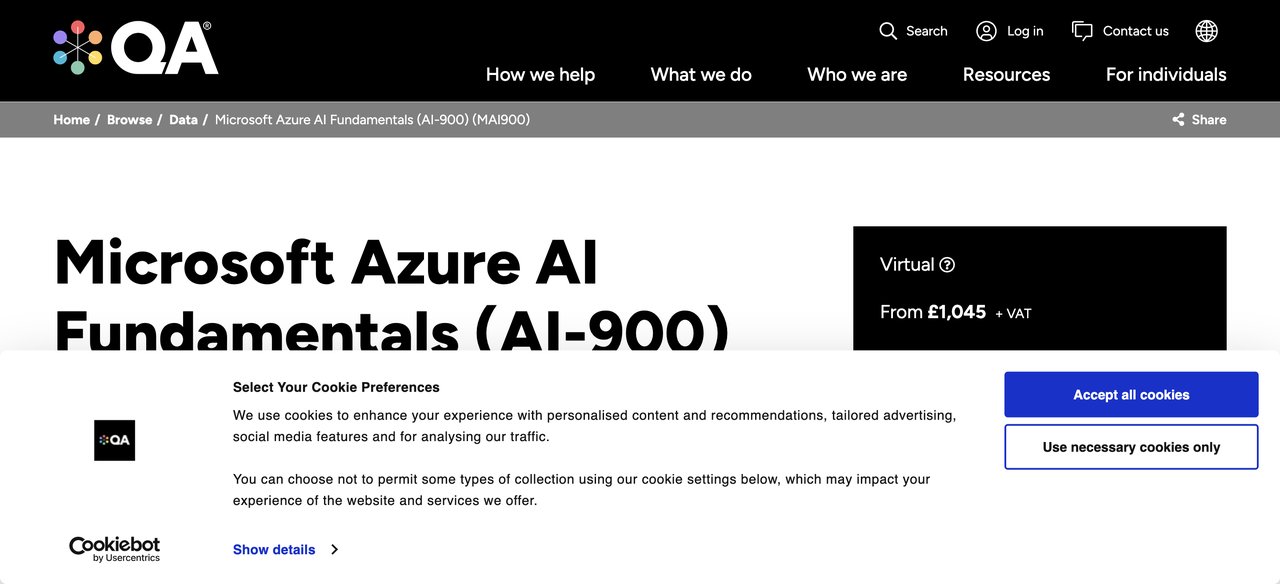
Microsoft Azure AI Fundamentals by QA Limited provides an introduction to AI workloads and services on Microsoft Azure. It covers machine learning, computer vision, NLP, and conversational AI, making it suitable for beginners in cloud-based AI environments.
Key Topics Covered: AI workloads on Azure, machine learning, computer vision, NLP.
Target Audience and Skill Level: Beginners in AI, particularly those working with cloud-based environments.
- Pros:
- Good coverage of AI workloads on Azure.
- Suitable for beginners.
- Cons:
- Azure-specific focus.
- Basic level, not suitable for advanced learners.
Who Should Enroll: Individuals new to AI or those using Microsoft Azure for AI applications.
Course 7: BCS Essential Certificate in Artificial Intelligence (AI) by QA Limited
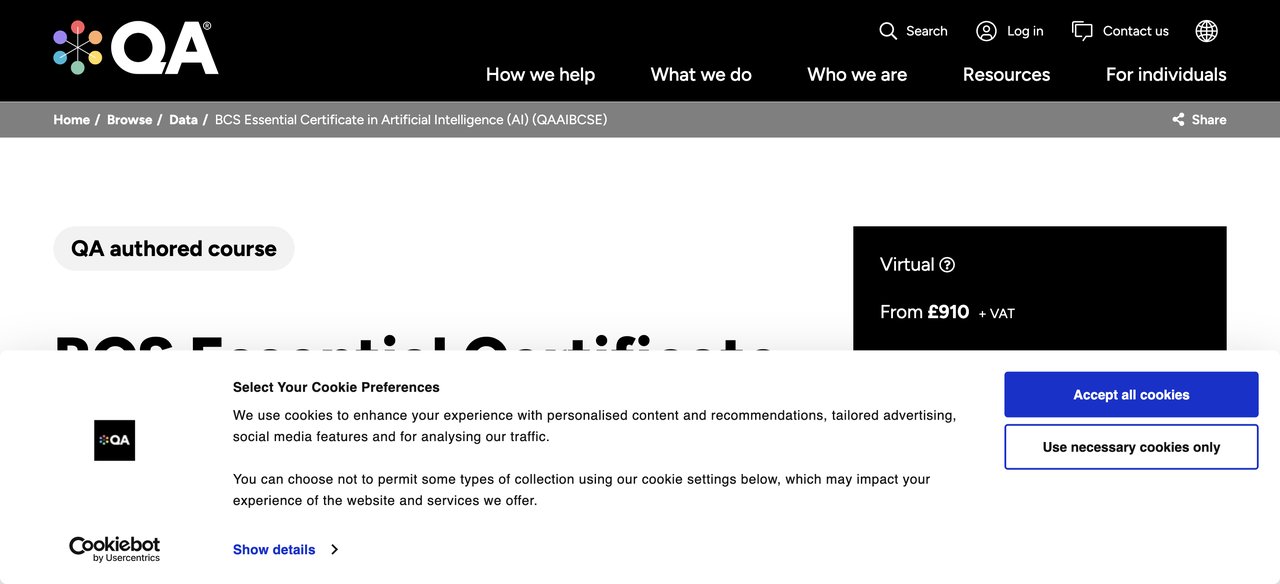
BCS Essential Certificate in Artificial Intelligence by QA Limited offers foundational knowledge in AI principles, terminology, benefits, and challenges. It is ideal for Quality Control Specialists seeking a broad understanding of AI's impact on work processes.
Key Topics Covered: AI terminology, principles, benefits, challenges, and future trends.
Target Audience and Skill Level: Professionals seeking foundational AI knowledge. No technical prerequisites required.
- Pros:
- Strong foundation in AI concepts.
- No technical prerequisites.
- Cons:
- Limited technical depth.
- Not focused on hands-on implementation.
Who Should Enroll: Those new to AI or looking to understand its broad implications in quality control.
Course 8: Developing Generative AI Applications on AWS by QA Limited
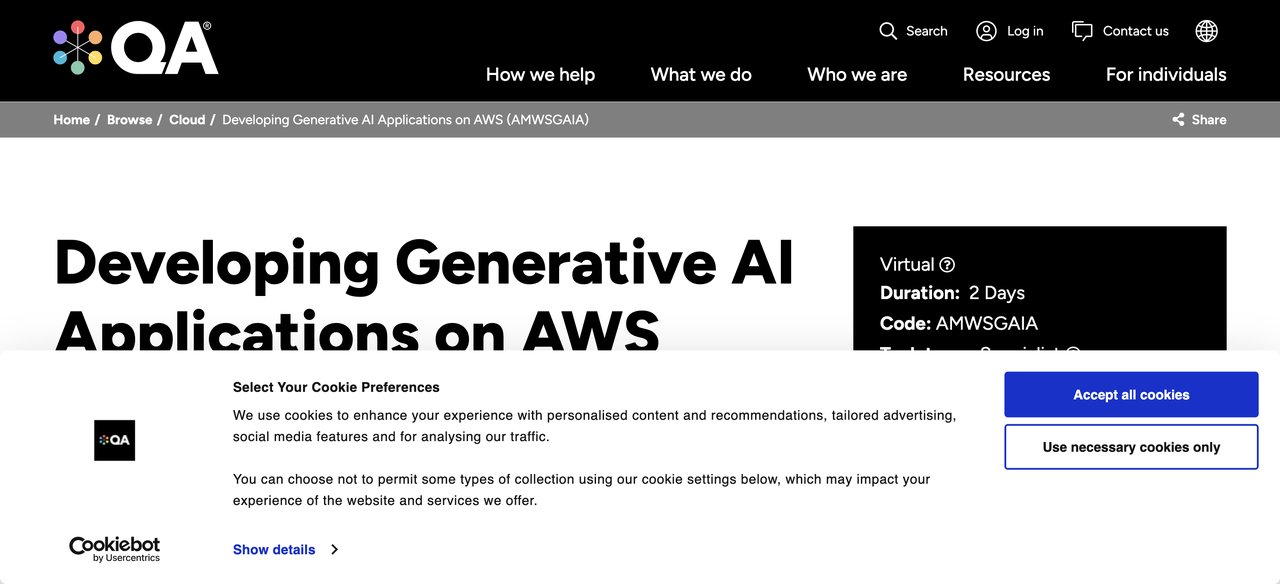
Developing Generative AI Applications on AWS by QA Limited is an advanced course for developers. It focuses on leveraging large language models without fine-tuning, using Amazon Bedrock and LangChain, and covers prompt engineering and architecture patterns.
Key Topics Covered: Generative AI basics, prompt engineering, architecture patterns, AWS and LangChain integration.
Target Audience and Skill Level: Developers with programming experience. Advanced level with hands-on projects.
- Pros:
- Focus on practical generative AI application development.
- Hands-on with AWS and LangChain.
- Cons:
- Requires programming experience.
- Higher cost.
Who Should Enroll: Developers interested in building generative AI applications on AWS.
Course 9: Certified Ethical Emerging Technologist (CEET) by QA Limited
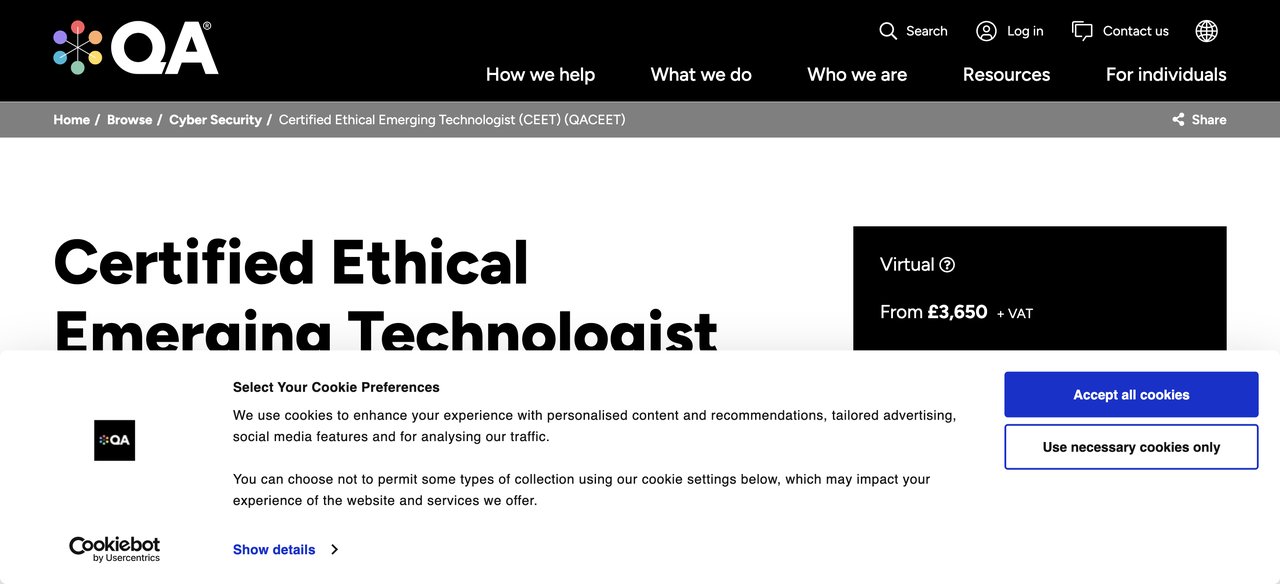
Certified Ethical Emerging Technologist by QA Limited focuses on ethical integrity in emerging data-driven technologies, covering ethical risks, safety, privacy, fairness, transparency, and accountability in AI systems.
Key Topics Covered: AI ethics, security, privacy, fairness, transparency, accountability.
Target Audience and Skill Level: Professionals in AI policy-making and ethical technology deployment. Focused on policy rather than technical skills.
- Pros:
- Comprehensive coverage of AI ethics.
- Addresses security, privacy, and bias.
- Cons:
- High cost.
- Less technical, more policy and ethics focused.
Who Should Enroll: Those responsible for ethical AI deployment and policy in their organizations.
Course 10: BCS Foundation in Artificial Intelligence by QA Limited
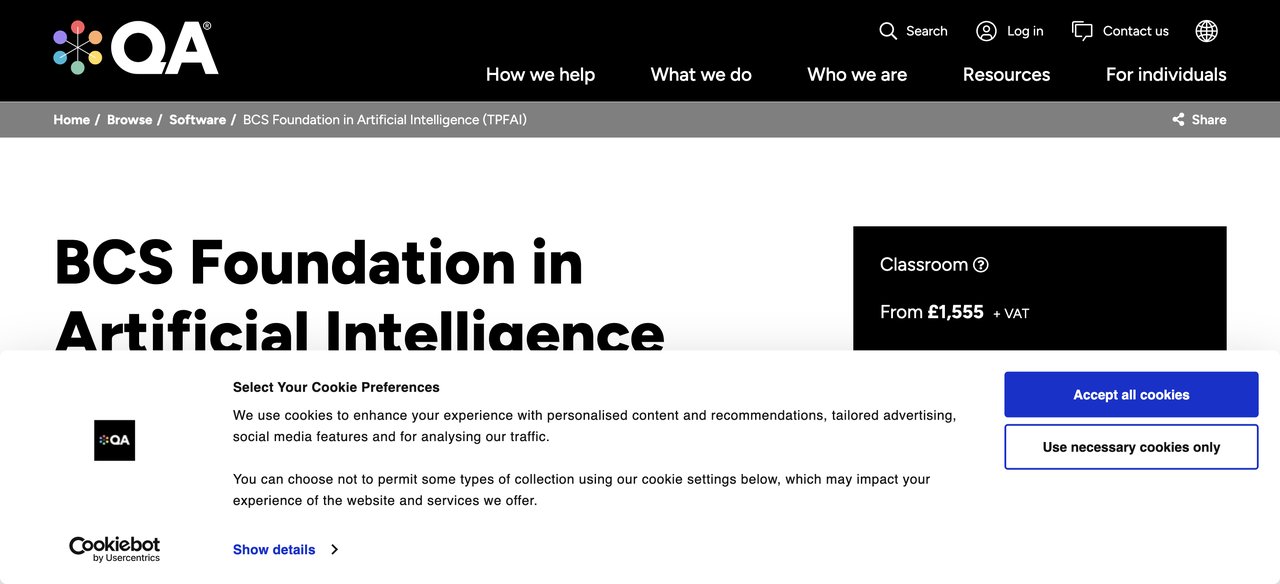
BCS Foundation in Artificial Intelligence by QA Limited builds on basic AI knowledge, covering intelligent agents, ethics, trustworthy AI, and sustainability aligned with UN goals.
Key Topics Covered: Intelligent agents, AI ethics, trustworthy AI, sustainability.
Target Audience and Skill Level: Professionals seeking foundational AI understanding with an ethical focus. No technical prerequisites required.
- Pros:
- Covers ethics and trustworthy AI principles.
- Focus on sustainability in AI.
- Cons:
- Limited technical/practical content.
- Not focused on advanced AI applications.
Who Should Enroll: Individuals interested in the ethical and sustainable use of AI technologies.
Course 11: AI Business Essentials for Leaders by QA Limited
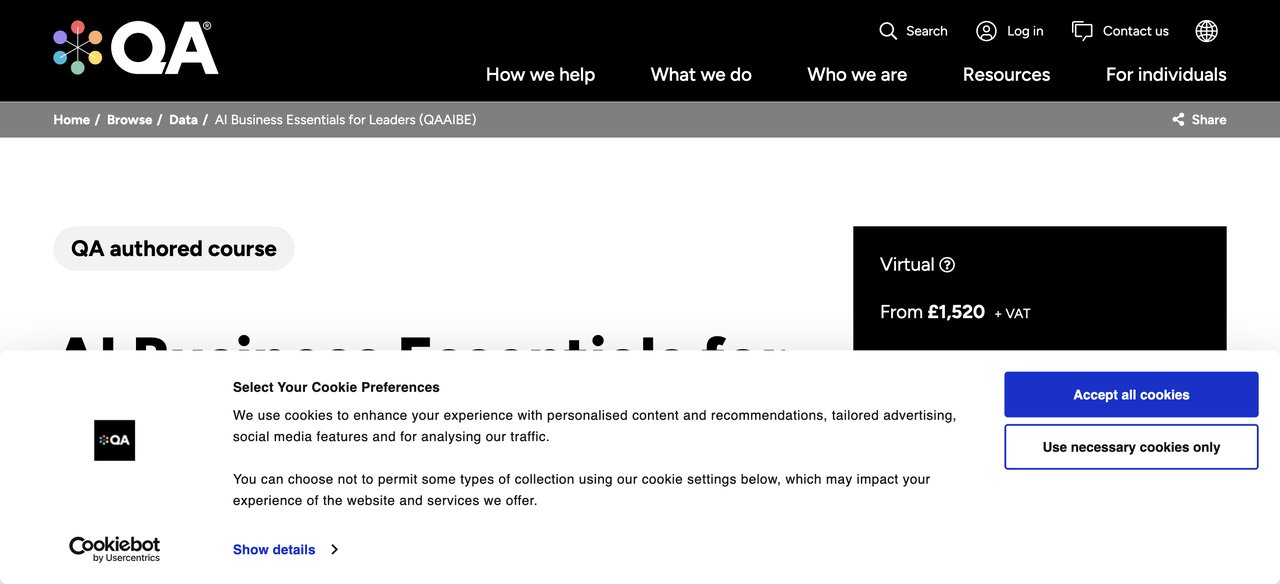
AI Business Essentials for Leaders by QA Limited is a one-day course introducing AI to business professionals aiming to implement AI solutions effectively. It includes practical skills like prompt engineering and fostering an AI-ready culture.
Key Topics Covered: AI strategy, prompt engineering, fostering AI-ready culture.
Target Audience and Skill Level: Business leaders and managers. No technical prerequisites required.
- Pros:
- Practical workshops and group projects.
- Focus on AI strategy and responsible deployment.
- Cons:
- Short duration.
- Limited technical depth.
Who Should Enroll: Business leaders and managers looking to integrate AI into their strategic planning.
Course 12: AI For Everyone by Deeplearning.ai via Coursera
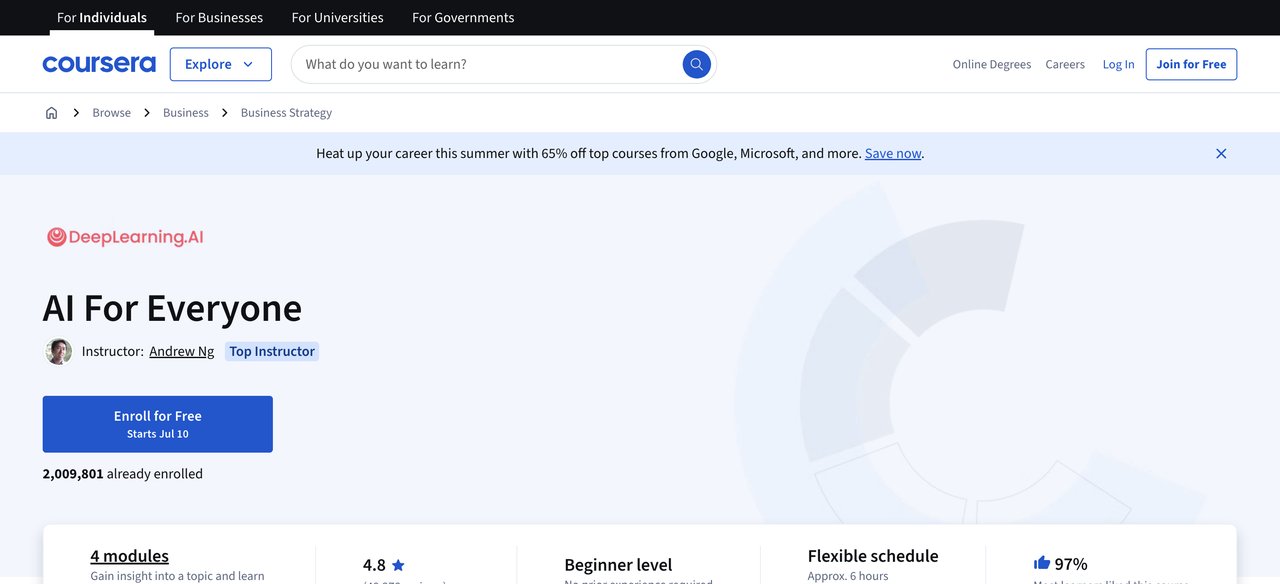
AI For Everyone by Deeplearning.ai offers a beginner-friendly overview of AI, focusing on AI’s capabilities and business integration. It is ideal for Quality Control Specialists seeking to understand AI without delving into technical details.
Key Topics Covered: AI literacy, business applications of AI, non-technical overview.
Target Audience and Skill Level: Beginners and non-technical professionals. No prerequisites required.
- Pros:
- No prerequisites in math or programming.
- Focus on AI literacy and business applications.
- Cons:
- Not technical.
- Limited hands-on coding.
Who Should Enroll: Managers and specialists looking to integrate AI into their business processes.
Course 13: Artificial Intelligence Nanodegree by Udacity
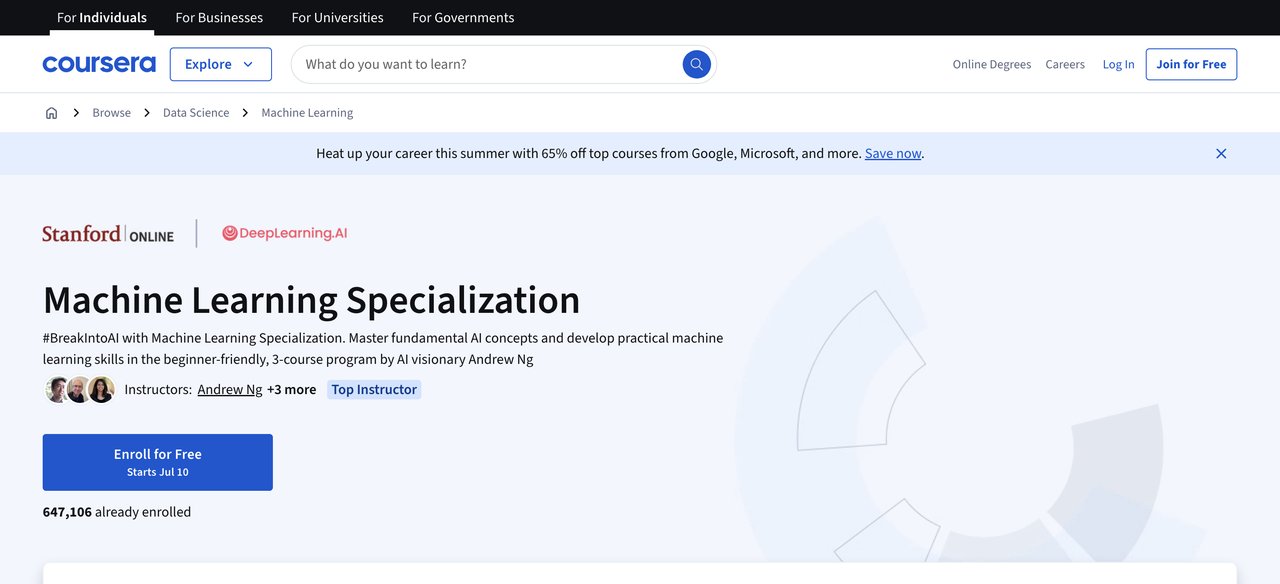
Artificial Intelligence Nanodegree by Udacity covers foundational AI techniques beyond machine learning, including constraint satisfaction, search strategies, and probabilistic reasoning. It includes hands-on projects for automation and decision-making.
Key Topics Covered: AI techniques, constraint satisfaction, search strategies, hands-on projects.
Target Audience and Skill Level: Intermediate learners with some programming knowledge.
- Pros:
- Strong theoretical foundation in AI.
- Hands-on projects to build portfolio.
- Cons:
- Higher cost.
- Requires some programming knowledge.
Who Should Enroll: Learners with programming experience seeking to deepen their AI knowledge through practical projects.
Course 14: Computer Science for Artificial Intelligence Professional Certificate by Harvard via edX
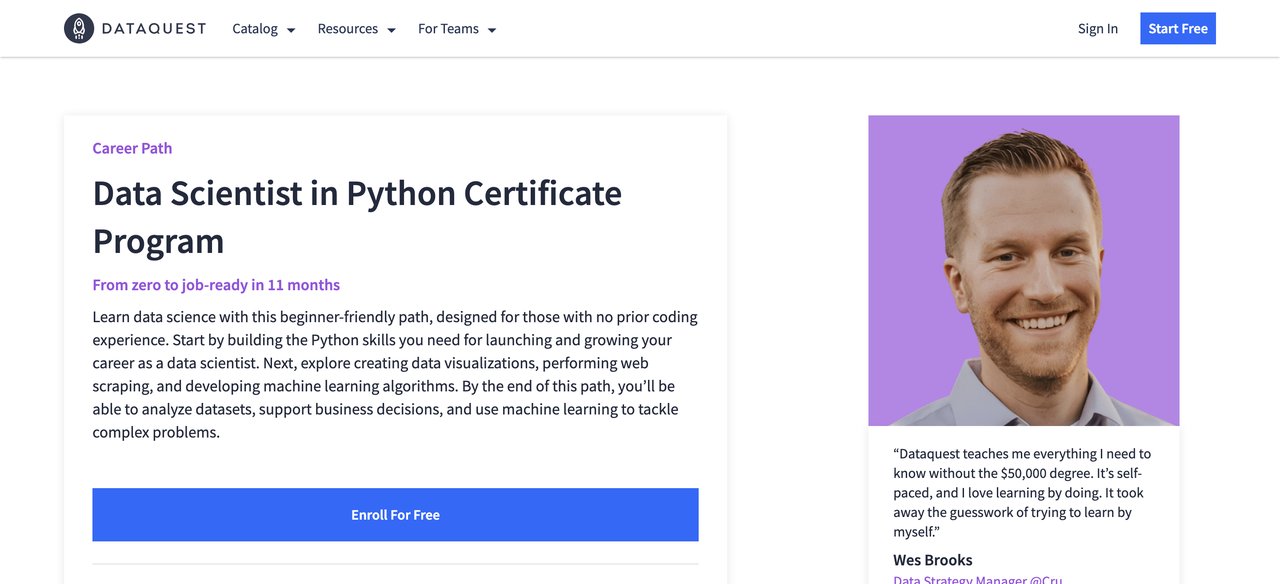
Computer Science for Artificial Intelligence Professional Certificate by Harvard offers an intermediate-level certificate with a solid foundation in computer science, programming, algorithms, and AI fundamentals. It includes practical AI projects relevant for quality inspection and automation.
Key Topics Covered: Computer science, programming, algorithms, AI fundamentals.
Target Audience and Skill Level: Intermediate learners with some coding experience.
- Pros:
- Comprehensive CS and AI curriculum.
- Challenging problem sets and projects.
- Cons:
- Demanding for beginners without coding experience.
- Requires time commitment.
Who Should Enroll: Those with a background in coding looking to expand their knowledge in AI and computer science.
Course 15: Deep Learning Specialization by Deeplearning.ai via Coursera
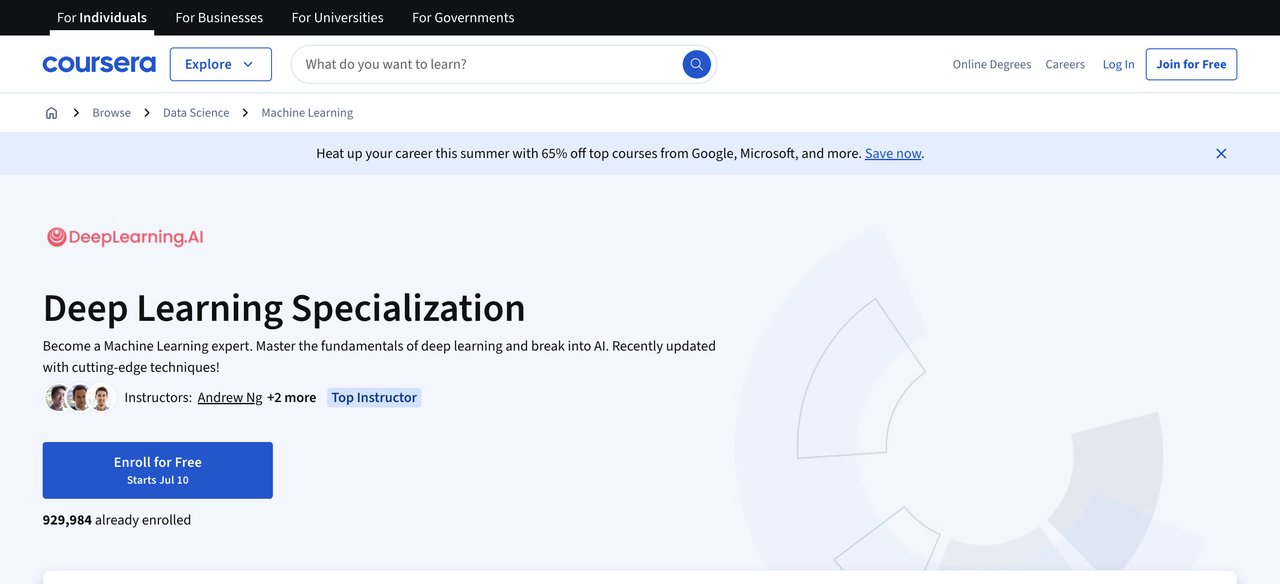
Deep Learning Specialization by Deeplearning.ai provides an intermediate course diving into neural networks, convolutional networks, sequence models, and NLP. It is essential for applying deep learning to defect detection and automated inspection.
Key Topics Covered: Neural networks, convolutional networks, sequence models, NLP.
Target Audience and Skill Level: Intermediate learners with prior Python and ML knowledge.
- Pros:
- Taught by Andrew Ng and Stanford experts.
- Hands-on coding and projects.
- Cons:
- Requires prior Python and ML knowledge.
- Intermediate technical level.
Who Should Enroll: Those with foundational AI knowledge looking to specialize in deep learning applications.
Course 16: LangChain - Develop LLM Powered Applications with LangChain by Udemy
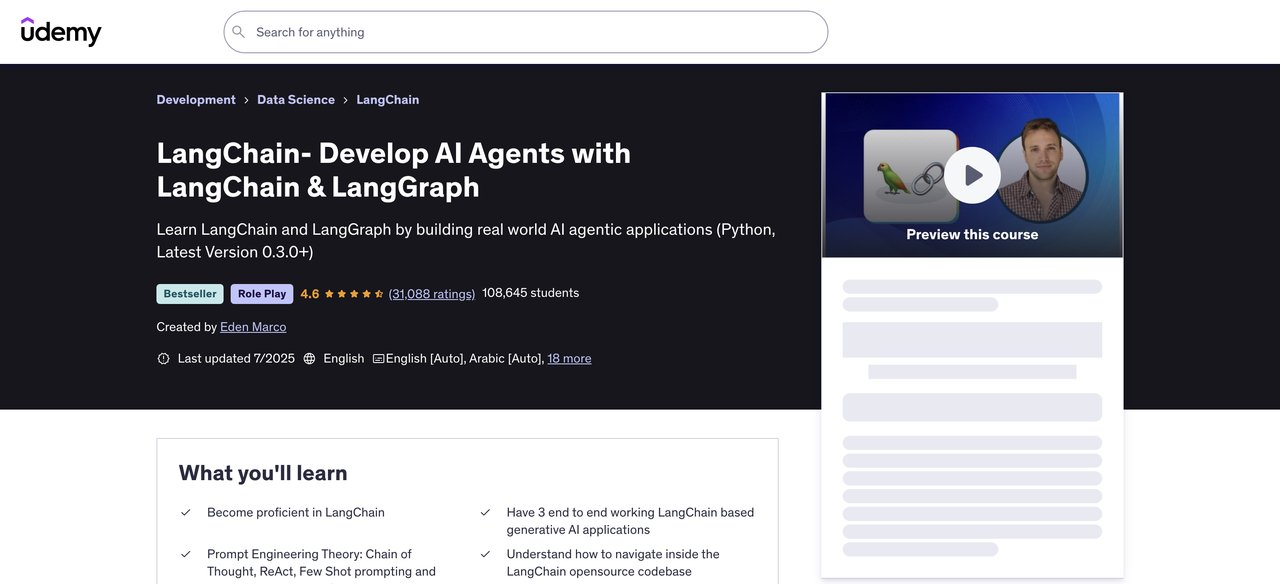
LangChain - Develop LLM Powered Applications by Udemy is for intermediate Python programmers, teaching how to build advanced applications using large language models (LLMs) with LangChain. It is useful for automating report generation and intelligent query systems.
Key Topics Covered: LLM innovations, prompt engineering, software development using LangChain.
Target Audience and Skill Level: Intermediate Python programmers.
- Pros:
- Practical projects with real-world applications.
- Covers recent LLM innovations like RAG.
- Cons:
- Requires solid Python skills.
- Focused on software development.
Who Should Enroll: Python programmers looking to expand their skills in advanced LLM applications.
Course 17: Large Language Models Professional Certificate by Databricks via edX
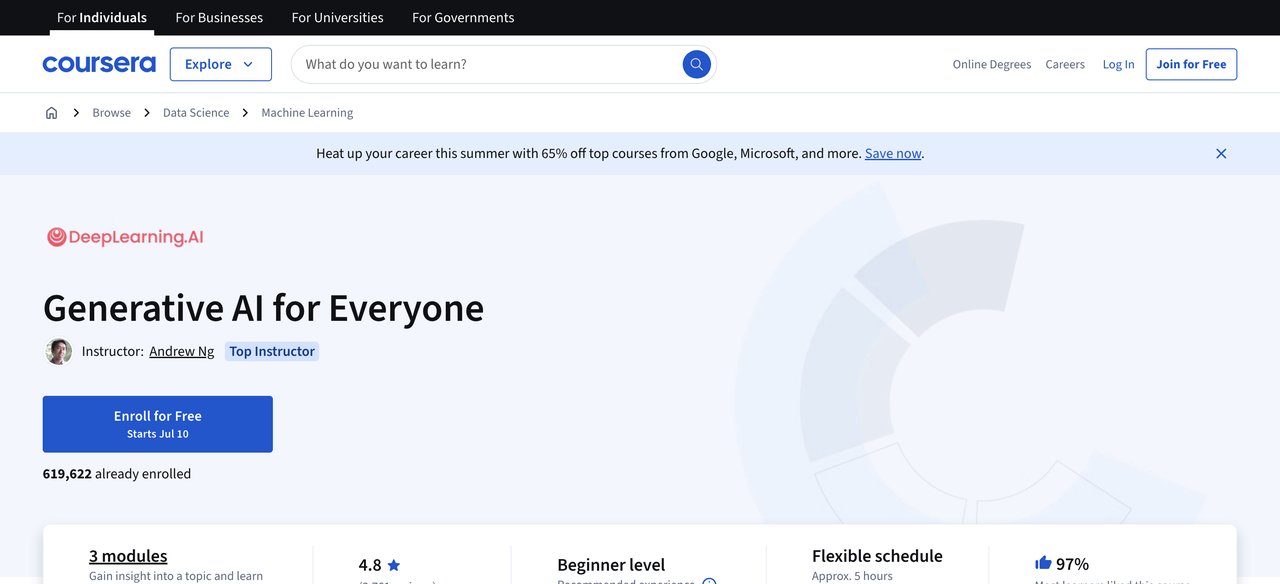
Large Language Models Professional Certificate by Databricks covers LLM theory, practical uses, and fine-tuning. It is suitable for implementing LLMs for automated anomaly detection and decision support.
Key Topics Covered: LLM architectures, practical Python and PyTorch labs, societal and operational impacts.
Target Audience and Skill Level: Intermediate to advanced learners with prior machine learning experience.
- Pros:
- Covers state-of-the-art LLM architectures.
- Includes practical Python and PyTorch labs.
- Cons:
- Requires prior machine learning experience.
- Advanced technical content.
Who Should Enroll: Experienced ML practitioners looking to specialize in LLM implementation and applications.
Overall Recommendations
For Quality Control Specialists seeking to enhance their AI capabilities, the choice of course depends largely on their current skill level, budget, and specific interests:
- CompleteAI Training offers the most comprehensive and affordable options for those seeking an ongoing, in-depth AI education tailored specifically for quality control. It's ideal for professionals at any skill level who want continuous updates and certifications.
- Certified AI Governance Professional and Certified Ethical Emerging Technologist are excellent for those focusing on AI policy, governance, and ethics, albeit at a higher cost.
- AI Quality Certification Program by TÜV SÜD is a solid choice for those looking to specialize in AI quality management, although pricing details are necessary for budgeting.
- Generative AI Essentials and AI For Everyone cater to beginners or non-technical professionals exploring AI's potential in business settings.
- For more technical and hands-on experience, courses such as Artificial Intelligence Nanodegree and Deep Learning Specialization provide strong theoretical foundations and practical projects, suitable for those with programming backgrounds.
Ultimately, the best course is determined by the individual's learning goals, existing skills, and professional needs within the realm of Quality Control. Each course offers unique insights and advantages that cater to different aspects of AI education and application.




